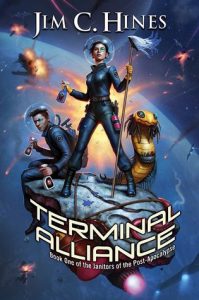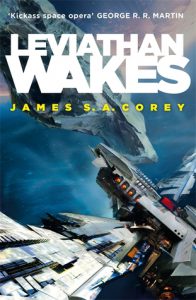 As part of OWS CyCon 2019, I’m hosting a stop in the World-Building Showcase Blog Hop. For this intriguing stop, we’ll be highlighting an Unbound to Earth tale (that is, the action is not necessarily set on Earth), but a full list of authors and topics is available on the CyCon website. I’m pleased to be hosting author Alice de Sampaio Kalkuhl for this installment of the hop, where we’ll find out more about the world of Alice’s series, Misguided Minds.
As part of OWS CyCon 2019, I’m hosting a stop in the World-Building Showcase Blog Hop. For this intriguing stop, we’ll be highlighting an Unbound to Earth tale (that is, the action is not necessarily set on Earth), but a full list of authors and topics is available on the CyCon website. I’m pleased to be hosting author Alice de Sampaio Kalkuhl for this installment of the hop, where we’ll find out more about the world of Alice’s series, Misguided Minds.
Q: Before we dive in to the specific questions about your world, what is Misguided Minds about?
Alice: The series is about how a group of researchers and the people who pick up on their work later use physics to alter the very concept of reality. Their research ultimately leads to space travel which opens the world up to a whole new reality.
Q: That sounds fascinating! Does language play any role in your world? Does everyone speak the same language, or is there variety? Did you invent any new slang or terminology during your world-building process?
Alice: Equations play a role and following the principle of Mathematics as a sort of language. They all speak equations. Obviously, the aliens that turn up in the later books have their own languages, but I don’t plan on writing any of the languages.
Q: So, what about the world (or worlds) in the series…what kinds of climates do your characters experience? Do they see a lot of change or is it always the same? Has your world always had this kind of climate, or has it changed over time?
Alice: The climate on earth is the climate on earth, though as the years progress climate change affects the planet. In space, all planets have different climates, and, on each planet, the climate varies between places.
Q: Is there any kind of faith system in your world? Did you draw inspiration from any real cultures, living or dead?
Alice: No, most of the researchers are atheist. A few of them have their own beliefs, but they don’t placate them around.
Q: What do people in your world do for fun? Are there sports, games, music, or other activities they do in their free time?
Alice: There are a couple of amusement planets and the researchers always made sure to bring some sort of music they do, no matter what they do.
Q: What kinds of transportation and other interesting technology do your characters have access to? Are they ahead, behind, or a mix of different kinds of tech compared to where we are now?
Alice: Throughout the series, the development of technology is one of the key results of the research.
Q: Do you have different races or enhanced humans with their own unique abilities inhabiting your world?
Alice: Yes, there are aliens, both in the books taking place on earth and elsewhere. A few of the characters also develop cyborg technology that is later implemented.
 Q: Let’s talk a little about your process. When you build a world, do you do a lot of research upfront, wing it completely, or something in between?
Q: Let’s talk a little about your process. When you build a world, do you do a lot of research upfront, wing it completely, or something in between?
Alice: I am a research student. My favourite inspiration is research papers. Whenever I see something that would make for a good aspect to a story, I write it into the notes to my writing project. Another thing I use is pages from the vogue.
Q: How central is the setting of your story to the story itself? Is it more of an interesting backdrop, or is it integral to the events of the story?
Alice: I use setting as something that I set the characters into, not something else.
Q: When helping the reader get to know the world you built, what techniques do you use? Do you tend to be upfront about things, or keep the reader in the dark and feed them only bits at a time?
Alice: I feed readers information one aspect at a time. Long expositions only bore everything.
Q: How much of a role does realism and hard scientific fact play in your world-building? Do you strive for 100% accuracy, or do you leave room for the fantastical and unexplainable in your world?
Alice: A lot. I don’t strive for 100% accuracy. What I strive for instead, is inspiration by research. Extra-information will turn up on my website though and that’s why I occasionally write short stories for.
Q: Do you have any specialized training or background from your “real life” that has informed your world-building?
Alice: I’m about to finish a BSc Genetics which helps with developing new species and I studied a little Physics in the past.
Q: How do you keep all of the details of your world and characters straight? Do you have a system for deciding on different factors and keeping it all organized, or does it live more in your head?
Alice: I write all my books in LaTeX projects which allows me to have note documents. It’s like free Scrivener with programming.
Q: Did you experience any difficulties while building your world? Any facts that refused to cooperate or inconsistencies you needed to address while editing
 Alice: It’s difficult to make sure that any new planet ends up being diverse in climate, species distribution, and culture. One thing I did was to design two species per new planet at least and to try having them not be too humanoid.
Alice: It’s difficult to make sure that any new planet ends up being diverse in climate, species distribution, and culture. One thing I did was to design two species per new planet at least and to try having them not be too humanoid.
Alice, thanks so much for dropping by to chat! Where can people find you on the web?
Alice: If you want to find more about my science fiction stories, check out my booth for OWS CyCon. All my stories are available on Inkitt. The Hyperspace Hypothesis which is the first in the series can be found here. For more details on my science fiction check out my website and my blog posts on my science fiction books.
For more stops in the OWS CyCon World-building Showcase, visit the tour page on the OWS CyCon website.


































